Login
Registration enables users to use special features of this website, such as past
order histories, retained contact details for faster checkout, review submissions, and special promotions.
order histories, retained contact details for faster checkout, review submissions, and special promotions.
Forgot password?
Registration enables users to use special features of this website, such as past
order histories, retained contact details for faster checkout, review submissions, and special promotions.
order histories, retained contact details for faster checkout, review submissions, and special promotions.
Quick Order
Products
Antibodies
ELISA and Assay Kits
Research Areas
Infectious Disease
Resources
Purchasing
Reference Material
Contact Us
Location
Corporate Headquarters
Vector Laboratories, Inc.
6737 Mowry Ave
Newark, CA 94560
United States
Telephone Numbers
Customer Service: (800) 227-6666 / (650) 697-3600
Contact Us
Additional Contact Details
Login
Registration enables users to use special features of this website, such as past
order histories, retained contact details for faster checkout, review submissions, and special promotions.
order histories, retained contact details for faster checkout, review submissions, and special promotions.
Forgot password?
Registration enables users to use special features of this website, such as past
order histories, retained contact details for faster checkout, review submissions, and special promotions.
order histories, retained contact details for faster checkout, review submissions, and special promotions.
Quick Order
PathPlusTM EPHA4 / EPH Receptor A4 Antibodies
EPHA4 is a receptor tyrosine kinase that binds membrane-bound ephrin to induce bidirectional signaling into neighboring cells. EPHA4 regulates cell morphology and integrin-dependent cell adhesion through regulation of the Rac, Rap and Rho GTPases activity. It plays an important role in the development of the nervous system, controlling different steps of axonal guidance including the establishment of the corticospinal projections. It may also control the segregation of motor and sensory axons during neuromuscular circuit development. It is also involved in synaptic plasticity, injury repair, and angiogenesis in the central nervous system. In amyotrophic lateral sclerosis and other neurodegenerative diseases, EPHA4 plays an important role in the degeneration of neurons and in disease progression, and is a putative therapy target. In immunohistochemistry, EPHA4 has highest cytoplasmic positivity in the brain, and it is also found in the thyroid, respiratory epithelial cells in the lung, reproductive tissues, skin, immune tissues, and at lower levels elsewhere.
References: J Neurosci. 2011 Dec 14;31(50):18364-80, PMID: 22171039; J Neurosci. 2007 Dec 19;27(51):14205-15, PMID: 18094260; J Neurochem. 2010 Apr;113(1):153-65; Cell Chem Biol. 2017 Mar 16;24(3):293-305, PMID: 28196613
6 PathPlusTM Antibodies
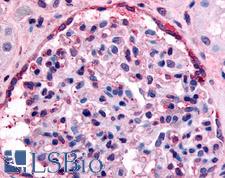
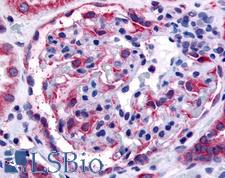
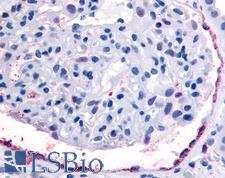
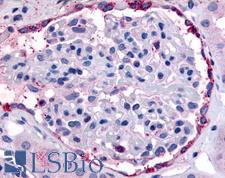
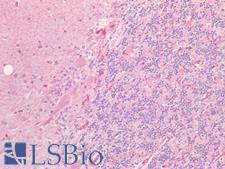
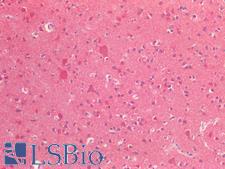
☰ Filters
Products
Antibodies
(6)
Type
Primary
(6)
Target
EPHA4 / EPH Receptor A4
(6)
Reactivity
Human
(6)
Mouse
(2)
Rat
(2)
Bat
(3)
Bovine
(3)
Dog
(3)
Hamster
(2)
Horse
(3)
Monkey
(4)
Pig
(3)
Rabbit
(2)
Application
IHC
(4)
IHC-P
(6)
WB
(2)
Flo
(1)
ELISA
(1)
IF
(1)
Host
rabbit
(6)
Product Group
PathPlus Neuro
(6)
Isotype
IgG
(1)
Clonality
polyclonal pc
(6)
Format
Unconjugated
(6)
Epitope
Internal
(4)
C-Terminus
(1)
aa40-70
(1)
Publications
No
(6)

Neuroscience
Fast Shipping
EPHA4 / EPH Receptor A4 Rabbit anti-Human Polyclonal (C-Terminus) Antibody
Rabbit, Mouse, Dog, Bovine, Rat, Hamster, Pig, Horse, Bat, Human, Monkey
ELISA, IHC, IHC-P
Unconjugated
50 µg/$395

Neuroscience
Fast Shipping
EPHA4 / EPH Receptor A4 Rabbit anti-Human Polyclonal (Internal) Antibody
Human, Monkey
IHC, IHC-P
Unconjugated
50 µg/$395

Neuroscience
Fast Shipping
EPHA4 / EPH Receptor A4 Rabbit anti-Human Polyclonal (Internal) Antibody
Rabbit, Mouse, Dog, Bovine, Rat, Hamster, Pig, Horse, Bat, Human, Monkey
IHC, IHC-P
Unconjugated
50 µg/$395

Neuroscience
Fast Shipping
EPHA4 / EPH Receptor A4 Rabbit anti-Human Polyclonal (Internal) Antibody
Dog, Bovine, Pig, Horse, Bat, Human, Monkey
IHC, IHC-P
Unconjugated
50 µg/$395

Neuroscience
EPHA4 / EPH Receptor A4 Rabbit anti-Human Polyclonal (aa40-70) Antibody
Human
Flo, IF, IHC-P, WB
Unconjugated
200 µl/$375

Neuroscience
EPHA4 / EPH Receptor A4 Rabbit anti-Human Polyclonal (Internal) Antibody
Human
IHC-P, WB
Unconjugated
50 µl/$375
Viewing 1-6
of 6
product results











